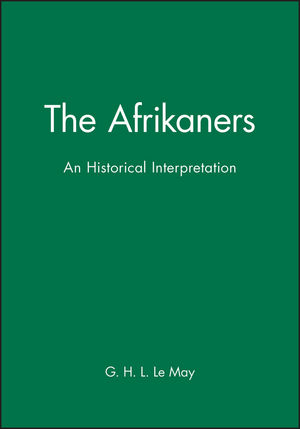The Afrikaners: An Historical InterpretationISBN: 978-0-631-18204-7
Hardcover
288 pages
January 1996, Wiley-Blackwell
 This is a Print-on-Demand title. It will be printed specifically to fill your order. Please allow an additional 15-20 days delivery time. The book is not returnable.
|
||||||
"Godfrey Le May is a distinguished political scientist, expert in British constitutional documents, but also in South African politics. He was Professor of Political Studies at the University of the Witwatersrand for many years before moving to Worcester College, Oxford. Few people are better qualified to unpick the fibres of the Afrikaner's history, a history bundled up with the involvement of the British in South Africa. Le May describes the Afrikaner quest for independence and survival elegantly and straightforwardly. his comparison of the Afrikaner choice of survival at Vereeniging in 1902 with de Klerk's choice of survival in 1990 is telling. Afrikaners' history is one of having to yield to force majeure, and it is this sense of having been wronged which has often motivated them even while they were being reviled for the far greater wrongs they visited on the black majority. For at least 200 years, Afrikaners have been aware of their uniqueness, a European people cut off from their roots, living in a continent where they have felt themselves under threat from the indigenous people and from colonial interference. The Afrikaner dream of complete independence to live as they wished, to co-opt the natives, to farm broad acres, to enjoy their exclusivity, has been a powerful element in their folk memory. South Africa was their country: other claimants - the blacks, the British, the missionaries and the adventurer capitalists - were required to acknowledge this truth. The Afrikaner quest for independence from Britain was doomed and their dream of domination of the subcontinent was, from the start, unrealistic. Even dressed up as a science, as the grand apartheid of the Verwoerd years, it was rank nonsense. It could have worked only if it had been accompanied by genuine partition, so there is some irony in the Right's, admittedly faltering, demands for their own homeland now. But the Afrikaners, although they said they wanted to keep apart from the black person in South Africa, really wanted to maintain the old master-servant relationship, in which they took comfort in ways far too complex for the world to understand. So Afrikaners passed the years 1948 to 1990 in the expectation of something which could never be achieved. Yet there have always been two opposing strands in Afrikaner thought, as Le May details, which have competed for dominance. The one strang has been characterised as 'verlig' or enlightened and the other as 'verkramp' or cramped. Le May shows this at work in literature and the arts (Prime Minister Vorster's brother said of an early Andre Brink novel: 'If this is literature, Sunday school is a brothel'); and of course in politics many of the notable opposition leaders have been Afrikaners. It is Le May's thesis that de Klerk's success was the triumph of the enlightened, but none the less achieved in the interest of survival only. Afrikaner politics, hitherto, has never been too scrupulous about the rights or hopes of others. When, in 1994, the Afrikaners were, as Le May says, demoted to a permanent political minority, their great trek of the mind ended. It remains to be seen how they will come to terms with this enormous psychological change. I would guess that they will try to portray themselves as authentic Africans, which after all is what 'Afrikaner' means. To do this they will make common cause with the Coloured people of the Cape. I have only one complaint about Le May's excellent book: it is a little short on detail about how the Afrikaners managed to come round to accepting the changes in South Africa. For example, there is no single reference to Frederik Van Zyl Slabert, one of the architects of the transformation, nor to the now well-documented efforts of some National Party ministers before and during the Kempton Park negotiations. The third force - of the dissenters in the police and military establishment - and its work will undoubtedly colour any future evaluation of the final years of Afrikaner power, but again little information is offered. Nevertheless, if the last chapter is somewhat cursory, this is in every other respect a concise, elegant and perceptive study." Daily Telegraph



